As we await the CW’s way more Hispanic, way more gay Dynasty reboot this October, why don’t we go back to the all-white, just a tad gay original ABC primetime soap opera that debuted in 1981.
By Paul Mavis
Starring John Forsythe, Linda Evans, Bo Hopkins, Pamela Sue Martin, Pamela Bellwood, Al Corley, Dale Robertson, John James, Wayne Northrop, Katy Kurtzman, Lee Bergere—as well as a veiled stand-in who would eventually become Joan Collins—Dynasty was considered the wildest thing on network television at that time, so let’s hitch up our outrageously broad shoulder pads and see how its first season shakes out today.
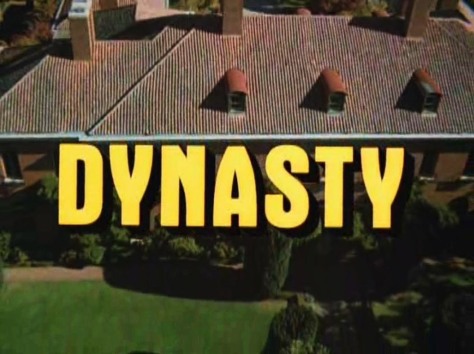 The set-up: oil, that sweet, dirty crude that lubes the wheels of worldwide capitalism. Charming, ruthless jungle animal Blake Carrington (John Forsythe), CEO of Denver-Carrington Oil, is used to taking what he wants…and he wants beautiful, sensitive, poor girl secretary Krystle Grant (Linda Evans) as his wife. Krystle loves Blake, but she’s afraid of his power, his wealth, and his violent temper—elements she doesn’t have to worry about with her former lover, Mathew Blaisdel (Bo Hopkins). Blaisdel, a geologist at Denver-Carrington, fell in love with Krystle while his troubled wife Claudia (Pamela Bellwood) was committed to an institution—which did a big number on their emotionally fragile teen daughter Lindsay’s (Katy Kurtzman) head. Matthew, having been kicked out of the Middle East when local scamps helped themselves to all those Denver-Carrington oil pumps, returns to Denver, Colorado to find out Krystle is marrying his boss—a fact that fabulously wealthy Blake is only too happy to rub in Matthew’s decidedly middle-class face.
The set-up: oil, that sweet, dirty crude that lubes the wheels of worldwide capitalism. Charming, ruthless jungle animal Blake Carrington (John Forsythe), CEO of Denver-Carrington Oil, is used to taking what he wants…and he wants beautiful, sensitive, poor girl secretary Krystle Grant (Linda Evans) as his wife. Krystle loves Blake, but she’s afraid of his power, his wealth, and his violent temper—elements she doesn’t have to worry about with her former lover, Mathew Blaisdel (Bo Hopkins). Blaisdel, a geologist at Denver-Carrington, fell in love with Krystle while his troubled wife Claudia (Pamela Bellwood) was committed to an institution—which did a big number on their emotionally fragile teen daughter Lindsay’s (Katy Kurtzman) head. Matthew, having been kicked out of the Middle East when local scamps helped themselves to all those Denver-Carrington oil pumps, returns to Denver, Colorado to find out Krystle is marrying his boss—a fact that fabulously wealthy Blake is only too happy to rub in Matthew’s decidedly middle-class face.
 Unfortunately, poor little innocent Krystle has no idea what kind of family she’s marrying into with Blake. Blake’s son, Steven (Al Corley), is a constant irritant to Blake, because he’s incredibly sensitive, quite intelligent, drearily humorless, and highly gay—the last one being the real kicker for man’s man Blake, who wants a son who’s as rough and tough as he is, and who will provide an heir of his own for Denver-Carrington Oil. But is Steven gay? Because as soon as he sees barely-together Claudia, he’s hitting the sheets with her—much to the consternation of former lover Ted Dinard (Mark Withers), who’s again living with Steven.
Unfortunately, poor little innocent Krystle has no idea what kind of family she’s marrying into with Blake. Blake’s son, Steven (Al Corley), is a constant irritant to Blake, because he’s incredibly sensitive, quite intelligent, drearily humorless, and highly gay—the last one being the real kicker for man’s man Blake, who wants a son who’s as rough and tough as he is, and who will provide an heir of his own for Denver-Carrington Oil. But is Steven gay? Because as soon as he sees barely-together Claudia, he’s hitting the sheets with her—much to the consternation of former lover Ted Dinard (Mark Withers), who’s again living with Steven.
Click to order Dynasty: The First Season at Amazon.
Your purchase helps pay this bills at this website!
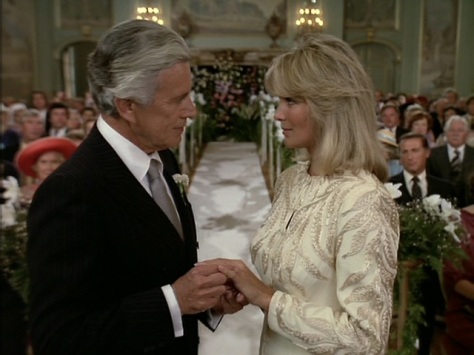 At least Steven keeps his sex partners down to two. His sister Fallon (Pamela Sue Martin) is like a trip to the deli: take a number and get in line, pal. A perverse, amoral little hustler with some serious Daddy issues, Fallon wants Daddy to make love to her to take her seriously as a businesswoman, so until he respects her for who she is, she’s going to hump anything in pants, including Blake’s equally scheming chauffeur, Michael (Wayne Northrup). The only thing Blake wants from Fallon, however, is for her to settle down—preferably in a business/marriage merger with Jeff Colby (John James), the boring, ultra-conservative nephew of Cecil Colby (Lloyd Bochner), the owner of ColbyCo Oil, a far-larger rival of Denver-Carrington. Fallon, however, much prefers the older Cecil, because of his money, his power, his ruthlessness (and not at all because he’s just like dear ‘ol Daddy) while she despises Krystle, who’s poor, and good, and kind…and who gets to sleep with Blake.
At least Steven keeps his sex partners down to two. His sister Fallon (Pamela Sue Martin) is like a trip to the deli: take a number and get in line, pal. A perverse, amoral little hustler with some serious Daddy issues, Fallon wants Daddy to make love to her to take her seriously as a businesswoman, so until he respects her for who she is, she’s going to hump anything in pants, including Blake’s equally scheming chauffeur, Michael (Wayne Northrup). The only thing Blake wants from Fallon, however, is for her to settle down—preferably in a business/marriage merger with Jeff Colby (John James), the boring, ultra-conservative nephew of Cecil Colby (Lloyd Bochner), the owner of ColbyCo Oil, a far-larger rival of Denver-Carrington. Fallon, however, much prefers the older Cecil, because of his money, his power, his ruthlessness (and not at all because he’s just like dear ‘ol Daddy) while she despises Krystle, who’s poor, and good, and kind…and who gets to sleep with Blake.
 So while poor Krystle is dodging Fallon and c-teasing Matthew (yes, that’s exactly what she’s doing, driving him crazy with those fuzzy angora sweaters cinched up to show him the double D delights he’s missing) and trying to get Blake’s sniffy, imperious majordomo Joseph (Lee Bergere) to cut her a f*cking break around the mansion, Blake is beset by larger problems: Matthew’s and wildcatter Walter Lankershim’s (Dale Robertson) big oil strike on land Blake had been trying to buy for years; and more imperatively a murder rap, when Blake loses his sh*t and zaps Steven’s lover, Ted.
So while poor Krystle is dodging Fallon and c-teasing Matthew (yes, that’s exactly what she’s doing, driving him crazy with those fuzzy angora sweaters cinched up to show him the double D delights he’s missing) and trying to get Blake’s sniffy, imperious majordomo Joseph (Lee Bergere) to cut her a f*cking break around the mansion, Blake is beset by larger problems: Matthew’s and wildcatter Walter Lankershim’s (Dale Robertson) big oil strike on land Blake had been trying to buy for years; and more imperatively a murder rap, when Blake loses his sh*t and zaps Steven’s lover, Ted.
 A few years back, at another site I used to write for (oy vey what a verkackte place—they don’t let you live, they don’t let you breathe!), I was given the second season of Dynasty to review…and then no more (the nerve). Well, I got a different site and a different editor now (“The Man of a Thousand Jobs!”) and from day one his barked edict to me has been, “Hey, you! Review any and all vintage crap you can lay your hands on! And get me some coffee!” (you just want to say, “Ohhhh, Mr. Grant!” when he does that).
A few years back, at another site I used to write for (oy vey what a verkackte place—they don’t let you live, they don’t let you breathe!), I was given the second season of Dynasty to review…and then no more (the nerve). Well, I got a different site and a different editor now (“The Man of a Thousand Jobs!”) and from day one his barked edict to me has been, “Hey, you! Review any and all vintage crap you can lay your hands on! And get me some coffee!” (you just want to say, “Ohhhh, Mr. Grant!” when he does that).
 So…Dynasty seemed like the right show to re-visit, not so much because of the new reboot that’s sporting some significant bought-and-paid-for online hype (although we certainly don’t mind getting carried along in those p.r. waters), but because I had pretty fond memories of the series back in the 1980s, with its first rather serious-minded set of episodes, and then all the glitzy, ever-expanding silliness of the subsequent eight seasons (the costumes and the jewelry, the soapy sexual hijinks, the constant state of hyperbolic bitchery, the gleefully reported Joan Collins/Linda Evans “feud,” all the poorly-choreographed slap-fests). Watching this first season of Dynasty, however, you can see where ABC almost pulled the plug. This first half-season ain’t the “Moldavian Massacre,” if you know what I mean.
So…Dynasty seemed like the right show to re-visit, not so much because of the new reboot that’s sporting some significant bought-and-paid-for online hype (although we certainly don’t mind getting carried along in those p.r. waters), but because I had pretty fond memories of the series back in the 1980s, with its first rather serious-minded set of episodes, and then all the glitzy, ever-expanding silliness of the subsequent eight seasons (the costumes and the jewelry, the soapy sexual hijinks, the constant state of hyperbolic bitchery, the gleefully reported Joan Collins/Linda Evans “feud,” all the poorly-choreographed slap-fests). Watching this first season of Dynasty, however, you can see where ABC almost pulled the plug. This first half-season ain’t the “Moldavian Massacre,” if you know what I mean.
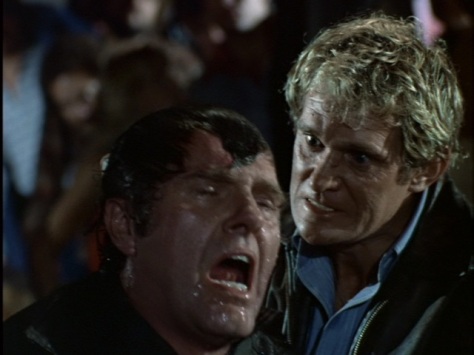 Dynasty was never original; it was a bald-faced attempt by ABC to come up with their own Dallas, the CBS prime time soap opera phenomenon that was on its way to becoming the number one show on network television. As originally conceived and created by the writing team of Richard and Esther Shapiro, Dynasty would focus on the oil industry (just like Dallas), by contrasting and interweaving a powerful, super-rich dysfunctional-yet-loving family with a middle-class dysfunctional-yet-loving family (just like Dallas), and in the process, exploit and invigorate every hoary old soap opera cliche in the book by amping up the sex and overall tone of viciousness (just like Dallas), with a mixed cast of familiar-faced veterans and newcomers (just like you guessed it).
Dynasty was never original; it was a bald-faced attempt by ABC to come up with their own Dallas, the CBS prime time soap opera phenomenon that was on its way to becoming the number one show on network television. As originally conceived and created by the writing team of Richard and Esther Shapiro, Dynasty would focus on the oil industry (just like Dallas), by contrasting and interweaving a powerful, super-rich dysfunctional-yet-loving family with a middle-class dysfunctional-yet-loving family (just like Dallas), and in the process, exploit and invigorate every hoary old soap opera cliche in the book by amping up the sex and overall tone of viciousness (just like Dallas), with a mixed cast of familiar-faced veterans and newcomers (just like you guessed it).
 And since Dallas had taken off into the ratings’ stratosphere on the rocket that was the series’ central villain—the evil, rutting, gleefully sadistic J.R. Ewing, brilliantly essayed by Larry Hagman—Dynasty would have its central “villain,” too: manipulative oil magnate Blake Carrington. However, the Shapiros and executive producer Aaron Spelling did too good of a job casting Blake for their lavish three hour Dynasty pilot, Oil. They hired big-screen has-been George Peppard, who proceeded to be so opinionated, so disagreeable during the shoot—at least to the Shapiros…according to the Shapiros—that Peppard was fired and the expensive pilot reshot, this time with agreeable nice guy John Forsythe.
And since Dallas had taken off into the ratings’ stratosphere on the rocket that was the series’ central villain—the evil, rutting, gleefully sadistic J.R. Ewing, brilliantly essayed by Larry Hagman—Dynasty would have its central “villain,” too: manipulative oil magnate Blake Carrington. However, the Shapiros and executive producer Aaron Spelling did too good of a job casting Blake for their lavish three hour Dynasty pilot, Oil. They hired big-screen has-been George Peppard, who proceeded to be so opinionated, so disagreeable during the shoot—at least to the Shapiros…according to the Shapiros—that Peppard was fired and the expensive pilot reshot, this time with agreeable nice guy John Forsythe.
 Delayed by the SAG strike that fall, ABC pulled out all the promotional stops in hyping Dynasty as the crown jewel in their 1980-1981 mid-season schedule. Giving Dynasty vacationing ABC’s Monday Night Football’s slot on Mondays at 9:00pm, however, was not what you would call helpful. Its competition was NBC’s Monday Night at the Movies (28th for the year) and steamrollers M*A*S*H (4th in the Nielsen’s) and House Calls (8th) over on CBS (two shows in particular that appealed to the same female demographic Dynasty was aimed at). Dynasty failed to crack the Nielsen Top Twenty (the barest minimum needed to justify its inflated production costs), and ABC wavered on whether or not to cancel it. According to Esther Shapiro, when this season’s last episode was shot, with the mysterious, unseen Alexis Carrington appearing at Blake’s murder trial, the producers still didn’t know if ABC was going to pick up the show for a second season (Shapiro admitted they also had no idea of who was going to play Alexis at this point, partly because of the series’ shaky status).
Delayed by the SAG strike that fall, ABC pulled out all the promotional stops in hyping Dynasty as the crown jewel in their 1980-1981 mid-season schedule. Giving Dynasty vacationing ABC’s Monday Night Football’s slot on Mondays at 9:00pm, however, was not what you would call helpful. Its competition was NBC’s Monday Night at the Movies (28th for the year) and steamrollers M*A*S*H (4th in the Nielsen’s) and House Calls (8th) over on CBS (two shows in particular that appealed to the same female demographic Dynasty was aimed at). Dynasty failed to crack the Nielsen Top Twenty (the barest minimum needed to justify its inflated production costs), and ABC wavered on whether or not to cancel it. According to Esther Shapiro, when this season’s last episode was shot, with the mysterious, unseen Alexis Carrington appearing at Blake’s murder trial, the producers still didn’t know if ABC was going to pick up the show for a second season (Shapiro admitted they also had no idea of who was going to play Alexis at this point, partly because of the series’ shaky status).
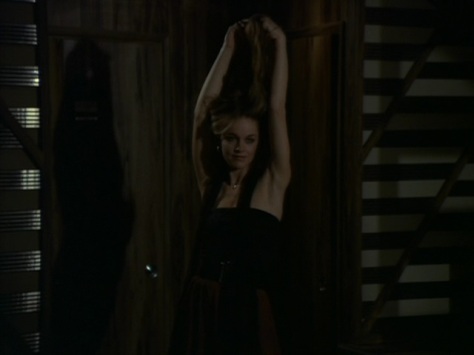 When the network finally did give the go-ahead, an aggressive publicity push from ABC followed, promoting Joan Collins as the series’ new reigning bitch villainess, along with a new night and time slot (Wednesdays at 10:00pm). Dynasty recovered quite well, to say the least, climbing into the Nielsen Top Twenty its second season, and eventually beating out its hated rival Dallas (in the 1984-1985 season) as the number one show in the country.
When the network finally did give the go-ahead, an aggressive publicity push from ABC followed, promoting Joan Collins as the series’ new reigning bitch villainess, along with a new night and time slot (Wednesdays at 10:00pm). Dynasty recovered quite well, to say the least, climbing into the Nielsen Top Twenty its second season, and eventually beating out its hated rival Dallas (in the 1984-1985 season) as the number one show in the country.
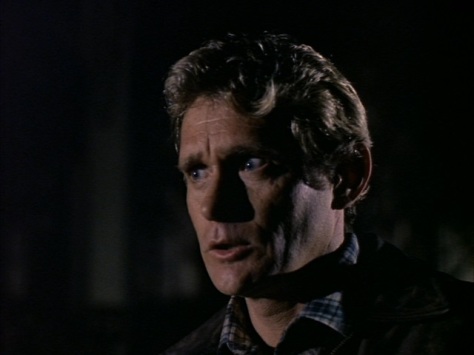 So why didn’t Dynasty catch on until its second season? Shapiro seems to think it was strictly the Blaisdels that tamped down the numbers. She quotes audience research that said the viewers only wanted to be inside the mansion; they hated the oil fields stuff and all that middle class ennui, she asserts. Those elements of the series don’t work as well as the Carringtons at play in their mansion (the Blaisdels are a collective bore)…although viewers seemed to love all that same stuff over on Dallas and eventually, Knots Landing. Nope; dollars to donuts, that Monday time slot was the main culprit. There were just too many women watching M*A*S*H and House Calls and NBC Monday Night at the Movies for there to be a whole lot left over for a new show that many viewers perceived to be an expensive but derivative knock-off of Dallas.
So why didn’t Dynasty catch on until its second season? Shapiro seems to think it was strictly the Blaisdels that tamped down the numbers. She quotes audience research that said the viewers only wanted to be inside the mansion; they hated the oil fields stuff and all that middle class ennui, she asserts. Those elements of the series don’t work as well as the Carringtons at play in their mansion (the Blaisdels are a collective bore)…although viewers seemed to love all that same stuff over on Dallas and eventually, Knots Landing. Nope; dollars to donuts, that Monday time slot was the main culprit. There were just too many women watching M*A*S*H and House Calls and NBC Monday Night at the Movies for there to be a whole lot left over for a new show that many viewers perceived to be an expensive but derivative knock-off of Dallas.
 Even though I remembered this first half-season as a pretty diverting “adult” drama back in ’81 (it’s remarkable what we thought was “adult” back then on network TV), it does play far too dour and humorless now when compared to the later seasons’ campy, increasingly outrageous tone—a tone that defines the series in most fans’ minds. Something just feels…“off” with these episodes, and there are plenty of factors playing into that collective bummer.
Even though I remembered this first half-season as a pretty diverting “adult” drama back in ’81 (it’s remarkable what we thought was “adult” back then on network TV), it does play far too dour and humorless now when compared to the later seasons’ campy, increasingly outrageous tone—a tone that defines the series in most fans’ minds. Something just feels…“off” with these episodes, and there are plenty of factors playing into that collective bummer.
 The Shapiros have frequently mentioned that audience research indicated no one was interested in the oil fields—and thus the entire Blaisdels/Lankershim half of the series. Perhaps more accurately: few people were interested in this element of the series because it was so poorly developed and integrated into the Carringtons subplot. Frankly: the Blaisdels and their petit bourgeouis problems are booooo-rrrrring compared to the flamboyant, outsized Carringtons. I’m a big fan of Bo Hopkins…when he’s acting crazy. However, he’s mismatched here with a role that calls for a bland, romantic, hero-type leading man (there are a couple of times where he forgets himself and indulges in his bug-eyed/whacko stare shtick, and the results are incongruously hilarious). We just don’t buy his chemistry with Linda Evans (and we need to, since we’re never shown their initial love affair), nor do we feel that he’d be any kind of a match for Forsythe’s powerful, crushing Blake.
The Shapiros have frequently mentioned that audience research indicated no one was interested in the oil fields—and thus the entire Blaisdels/Lankershim half of the series. Perhaps more accurately: few people were interested in this element of the series because it was so poorly developed and integrated into the Carringtons subplot. Frankly: the Blaisdels and their petit bourgeouis problems are booooo-rrrrring compared to the flamboyant, outsized Carringtons. I’m a big fan of Bo Hopkins…when he’s acting crazy. However, he’s mismatched here with a role that calls for a bland, romantic, hero-type leading man (there are a couple of times where he forgets himself and indulges in his bug-eyed/whacko stare shtick, and the results are incongruously hilarious). We just don’t buy his chemistry with Linda Evans (and we need to, since we’re never shown their initial love affair), nor do we feel that he’d be any kind of a match for Forsythe’s powerful, crushing Blake.
 Pamela Belwood is good as “mad housewife” Claudia, but it’s a performance in service of an overly-familiar character that was already tired way back then (let’s agree not to even discuss the daughter). As for Dale Robertson’s wildcatter Walter Lankershim…his is such a mannered, hammy turn, it’s impossible to take him seriously in a similarly too-familiar role (for contrast, look at the sultry, always-near-hysteria performance of cheated-on wife Linda Gray, and the steely, nasty, commanding piece from fellow B-cowboy star Jim Davis as patriarch Jock Ewing, both over on Dallas).
Pamela Belwood is good as “mad housewife” Claudia, but it’s a performance in service of an overly-familiar character that was already tired way back then (let’s agree not to even discuss the daughter). As for Dale Robertson’s wildcatter Walter Lankershim…his is such a mannered, hammy turn, it’s impossible to take him seriously in a similarly too-familiar role (for contrast, look at the sultry, always-near-hysteria performance of cheated-on wife Linda Gray, and the steely, nasty, commanding piece from fellow B-cowboy star Jim Davis as patriarch Jock Ewing, both over on Dallas).
 Most importantly: the middle-class Blaisdels are superfluous to the series’ main arc. We already have the dichotomy between rich and poor at the mansion: Krystle versus the Carringtons. Those scenes where unsure, naive Krystle is getting pummeled by that snooty viper Fallon, or alternatively patronizing/violent Blake, as well as the smug household staff (arch, superior majordomo Joseph is a scream), more than satisfy our own “screw the rich because we’re jealous of them!” yearnings. The Blaisdels just aren’t needed here on Dynasty.
Most importantly: the middle-class Blaisdels are superfluous to the series’ main arc. We already have the dichotomy between rich and poor at the mansion: Krystle versus the Carringtons. Those scenes where unsure, naive Krystle is getting pummeled by that snooty viper Fallon, or alternatively patronizing/violent Blake, as well as the smug household staff (arch, superior majordomo Joseph is a scream), more than satisfy our own “screw the rich because we’re jealous of them!” yearnings. The Blaisdels just aren’t needed here on Dynasty.
RELATED | More 1980s TV reviews
 Dynasty’s gay Steven Carrington certainly generated ad copy for ABC’s promotional efforts, even though Al Corley’s Steven wasn’t the first gay character on TV as some suggested. There had been other one-off characters in the years prior (Archie’s pal on All in the Family, Phyllis’s brother on The Mary Tyler Moore Show), as well as TV movies (1972’s That Certain Summer) and of course, ABC’s own Soap, with the first sustained reoccurring gay character, played by Bill Crystal (if you want to get technical and picky—as well as bitchy—Crystal was beaten to the punch by Paul Lynde on Bewitched and Hollywood Squares and Charles Nelson Reilly on Match Game). But there was a lot of press generated about Corley’s Steven character, and he did add that “adult” element that ABC thought would make Dynasty stand apart from Dallas.
Dynasty’s gay Steven Carrington certainly generated ad copy for ABC’s promotional efforts, even though Al Corley’s Steven wasn’t the first gay character on TV as some suggested. There had been other one-off characters in the years prior (Archie’s pal on All in the Family, Phyllis’s brother on The Mary Tyler Moore Show), as well as TV movies (1972’s That Certain Summer) and of course, ABC’s own Soap, with the first sustained reoccurring gay character, played by Bill Crystal (if you want to get technical and picky—as well as bitchy—Crystal was beaten to the punch by Paul Lynde on Bewitched and Hollywood Squares and Charles Nelson Reilly on Match Game). But there was a lot of press generated about Corley’s Steven character, and he did add that “adult” element that ABC thought would make Dynasty stand apart from Dallas.
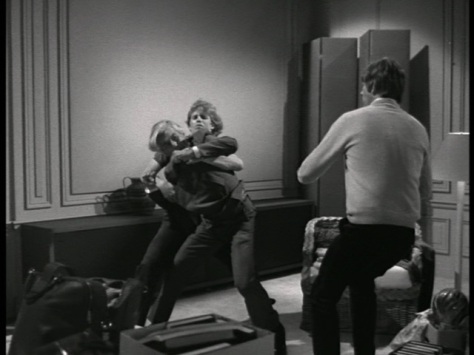 Whatever the producer/writers’ intent with the Steven character was, however, is humorously lost when he immediately starts ping-ponging back and forth between Claudia and Ted. It’s not a matter of whether or not he’s “confused;” we’re not really asked to wonder if he’s gay or not (which of course is avoiding the question…which only further waters down the character). It’s that the producers are trying to use the character as a link between the Blaisdels and the Carringtons and it simply doesn’t work (for instance, we never buy that he would work for Matt and Walter). Everything is so tentative, due in part to the network censorship restrictions of the time, that we can’t get a handle on what the hell Steven is doing…or not doing. His final scene with crying, soon-to-be-murder victim Ted is a perfect example of this: one minute Steven and he are in the depths of a tortured, doomed kiss-off, and the next, they’re both blasé, smiling, and shaking hands like they just ran into each other at Target.
Whatever the producer/writers’ intent with the Steven character was, however, is humorously lost when he immediately starts ping-ponging back and forth between Claudia and Ted. It’s not a matter of whether or not he’s “confused;” we’re not really asked to wonder if he’s gay or not (which of course is avoiding the question…which only further waters down the character). It’s that the producers are trying to use the character as a link between the Blaisdels and the Carringtons and it simply doesn’t work (for instance, we never buy that he would work for Matt and Walter). Everything is so tentative, due in part to the network censorship restrictions of the time, that we can’t get a handle on what the hell Steven is doing…or not doing. His final scene with crying, soon-to-be-murder victim Ted is a perfect example of this: one minute Steven and he are in the depths of a tortured, doomed kiss-off, and the next, they’re both blasé, smiling, and shaking hands like they just ran into each other at Target.
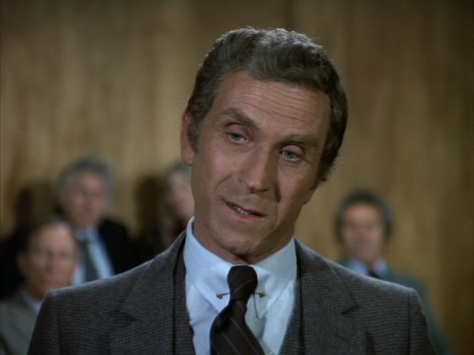 Corley doesn’t exactly help matters, either, with his portrayal; to wit: would it kill you to have Steven crack a f*cking smile just once? I may be remembering this wrong, but I thought Corley was fired for bad-mouthing the show, specifically for complaining about how the producers were mistreating his character. He certainly may have had a point, but it’s your job as the actor to make the character interesting, regardless of script limitations, and in that, Corley fails big time. His portrayal of a tortured man/child unsure of his place with the Carringtons and with his own sexuality carries about as much weight as one of those scenes where Marcia Brady stormed up to her room to moon about Doug Simpson. As designed and executed, Steven Carrington just doesn’t cut it.
Corley doesn’t exactly help matters, either, with his portrayal; to wit: would it kill you to have Steven crack a f*cking smile just once? I may be remembering this wrong, but I thought Corley was fired for bad-mouthing the show, specifically for complaining about how the producers were mistreating his character. He certainly may have had a point, but it’s your job as the actor to make the character interesting, regardless of script limitations, and in that, Corley fails big time. His portrayal of a tortured man/child unsure of his place with the Carringtons and with his own sexuality carries about as much weight as one of those scenes where Marcia Brady stormed up to her room to moon about Doug Simpson. As designed and executed, Steven Carrington just doesn’t cut it.
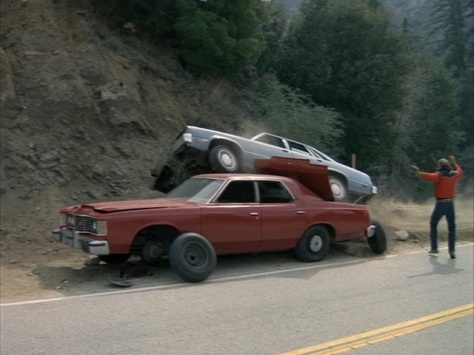 Every 80s prime time soap lives and dies by its central villain, and at isolated moments in Dynasty, you might think that villain was Blake Carrington. Unfortunately, the producers and writers again mitigate the character’s effect by having him unconvincingly switch back and forth between absolute monster (raping his wife Krystle) and saint (whisking her off to some romantic place or other on his jet). Again, it’s not a matter of complexity. Of course we want a series’ main villain to be layered; otherwise, the show becomes a cartoon. However, there’s “layered,” and then there’s “compromised,” and that’s how Forsythe’s Blake comes off here…and you can probably put the blame on the actor himself.
Every 80s prime time soap lives and dies by its central villain, and at isolated moments in Dynasty, you might think that villain was Blake Carrington. Unfortunately, the producers and writers again mitigate the character’s effect by having him unconvincingly switch back and forth between absolute monster (raping his wife Krystle) and saint (whisking her off to some romantic place or other on his jet). Again, it’s not a matter of complexity. Of course we want a series’ main villain to be layered; otherwise, the show becomes a cartoon. However, there’s “layered,” and then there’s “compromised,” and that’s how Forsythe’s Blake comes off here…and you can probably put the blame on the actor himself.
 The Shapiros have never been shy about discussing the origins of the Dynasty pilot; in particular, detailing the reasons for firing big screen actor George Peppard in the Blake role (with surly, sneering Peppard—both on and off screen—it was never a matter of whether or not you liked him in a role…he didn’t want you to like him. Period. He would have been a fantastic Blake Carrington, if someone on the production team had known how to handle him). Nor has Richard Shapiro failed to note numerous times that with the addition of John Forsythe to the cast, the lead of light, fluffy TV series like Bachelor Father and To Rome with Love made it very clear he was uncomfortable with some of the things Blake was doing in the scripts. By all accounts, Forsythe very much wanted to be liked by the weekly TV audience.
The Shapiros have never been shy about discussing the origins of the Dynasty pilot; in particular, detailing the reasons for firing big screen actor George Peppard in the Blake role (with surly, sneering Peppard—both on and off screen—it was never a matter of whether or not you liked him in a role…he didn’t want you to like him. Period. He would have been a fantastic Blake Carrington, if someone on the production team had known how to handle him). Nor has Richard Shapiro failed to note numerous times that with the addition of John Forsythe to the cast, the lead of light, fluffy TV series like Bachelor Father and To Rome with Love made it very clear he was uncomfortable with some of the things Blake was doing in the scripts. By all accounts, Forsythe very much wanted to be liked by the weekly TV audience.
 How much of that retooling took place during the shooting of these 12 episodes is up for grabs, but Blake does wobble back and forth between good and evil with disconcerting—and dramatically disrupting—regularity. Given a choice between suave romantic and controlling sociopath…I’ll take Blake when he’s nasty as hell. Forsythe may have been correct that for his personal “brand,” if you will, the TV audience would prefer him more romantic, more kind than ruthless. However, he’s such a skilled, subtle actor, I find his “devil Blake” moments far more compelling. Just a year or two earlier, Forsythe had turned in a terrific bad guy performance as a powerful, perverted judge in Al Pacino’s big screen …And Justice for All, so he has no problem with scenes where Blake must be cruel or heartless or domineering. But…female viewers loved the romance between Krystle and Blake, so I guess it was inevitable that the producers would skew in that direction, and away from a J.R. Ewing-like villain. That, however, doesn’t help the continuity in this first half-season.
How much of that retooling took place during the shooting of these 12 episodes is up for grabs, but Blake does wobble back and forth between good and evil with disconcerting—and dramatically disrupting—regularity. Given a choice between suave romantic and controlling sociopath…I’ll take Blake when he’s nasty as hell. Forsythe may have been correct that for his personal “brand,” if you will, the TV audience would prefer him more romantic, more kind than ruthless. However, he’s such a skilled, subtle actor, I find his “devil Blake” moments far more compelling. Just a year or two earlier, Forsythe had turned in a terrific bad guy performance as a powerful, perverted judge in Al Pacino’s big screen …And Justice for All, so he has no problem with scenes where Blake must be cruel or heartless or domineering. But…female viewers loved the romance between Krystle and Blake, so I guess it was inevitable that the producers would skew in that direction, and away from a J.R. Ewing-like villain. That, however, doesn’t help the continuity in this first half-season.
RELATED | More nighttime soap reviews
Finally, the overall tone of these 12 episodes is miscued. Expensive-looking, with big sets and expensive costumes and props, this first season of Dynasty expanded even further the already high-gloss house style of ABC dramas of that time. But along with “glossy” came “glassy-eyed,” in Dynasty, as in everyone and everything seemingly timed at 3/4th speed. Somehow someone equated “classy” with “funereal,” because that’s not only the pacing but the ambiance that permeates Dynasty’s initial half season. You’re not going to beat Dallas, that ballsy, crude melodrama, by being classy. You can be classy, but you have to be grotesque, too, and campy, and thankfully, this season’s courtroom finale finally seems to point the way for future Dynasty success, what with its cliffhanger, its ridiculous black and white flashbacks to the murder (love those too-obvious stunt guy stand-ins!), and all the silly overwrought close-ups. When Blake’s mystery ex-wife arrives, and each character is individually freeze-framed in startled alarm—with all the men hilariously grabbing their chins—that’s the kind of stuff we’ll come to expect from the coming seasons of Dynasty.
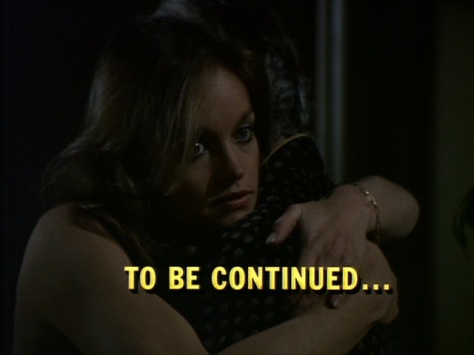
Here are the 12 episodes from the first half-season of Dynasty:
Oil, Parts 1 & 2 (January 12th, 1981)
As wealthy oil tycoon Blake Carrington prepares to marry his former secretary, Krystle, Steven and Fallon, his children from his previous marriage, arrive in Denver for the ceremony—as does Krystle’s old flame, Matthew Blaisdel. Things get even more complicated when an old friend of Matthew’s, Walter Lankershim, approaches Matthew about forming a business partnership. But Matthew says his loyalties lie with Blake—until Walter’s oil well is sabotaged and it looks like Blake was behind it.
Composer Bill Conti’s soaring, majestic theme over split-screen shots of Denver (and California) rivals rival Dallas’ opener, that’s for sure, while shooting at the spectacular Filoli Estate in California spoils us for the coming studio-bound episodes. Too bad the rest of this season didn’t match up to the classic moment when Krystle gets a riding crop at her bridal shower (“It’s a whip for beating your servants,” she’s helpfully told—an all-time great line). Pamela Bellwood’s good performance would register a lot more if we knew what triggered Claudia’s illness in the first place, while Bo Hopkins looks uncomfortable courting Linda Evans. Pamela Sue Martin enters the books as one of TV’s most delectable vixens (a nice switch from her Nancy Drew days) with her horny, bitchy, damaged Fallon character (having her bite the heads off Krystle’s and Blake’s wedding cake figurines is quite amusing). Attention history re-writers: today’s antifa thugs will immediately demand that all discs of Dynasty be confiscated and shredded when they hear loving father Blake sarcastically suggests to son Steven the creation of the “Steven Carrington Institute for the Treatment and Study of Faggotry.”
Oil, Part 3 (January 12th, 1981)
As Blake and Krystle recite their wedding vows, Walter arrives with a gun determined to get revenge. Jeff Colby pursues Fallon even though she’s more interested in his uncle, and Matthew quits his job at Denver-Carrington to work with Walter.
Poor writing makes us work to figure out if Claudia isn’t into sex anymore…or if Matt’s a limp noodle. Whatever it is, it ain’t working anymore for the Blaisdels. Fallon’s “f*ck you!” speech about people who hate oil companies should be printed up at every gas station, while Blake briefly pulls up even with J.R. Ewing when he sicks his Doberman Pinschers on Walter. At his wedding. And then laughs it off…before turning his goons on Walter for a post-bite beat down. Now that’s a primetime soap opera villain we can love!
The Honeymoon (January 19th, 1981)
The honeymoon is cut short when Blake’s Middle East oil business runs into trouble, Krystle has trouble dealing with the household staff, Cecil Colby has a proposition for Fallon, and Steven goes to work for Matthew Blaisdel.
When Krystle brings back a crummy gift shop tiki idol from her honeymoon, Fallon smirks and suggests, “Maybe you can have it wired for a lamp.” Classic. The Blaisdels continue to bore us with their domestic problems, while infinitely more interesting things are going on over at the mansion…like Carrington lawyer Peter Mark Richman (always spot on…and still going at 90!) matter-of-factly telling Fallon, “most little girls realize by 6 they can’t marry their daddies.” Denied! Blake lays out the mansion help for Krystle’s benefit, before patronizing her with, “You will learn. I will teach you.” She’s putty in his hands…. And Cecil Colby (another welcome pro, Lloyd Bochner) sums up the show nicely: “Passion dies. Power remains.”
The Dinner Party (January 26th, 1981)
When Blake throws an elaborate dinner party and invites Matthew in hopes of luring him back to Denver-Carrington, Fallon overhears Matthew telling Krystle he still loves her. Steven befriends Matthew’s emotionally unstable wife, Claudia.
No doubt the women in TV Land did a collective swoon when Krystle was told of her clothing allowance for the year: $100,000. A potentially interesting angle—could Krystle become more like Blake?—is unfortunately dropped after Krystle threatens Joseph to get her way around the house. Oh, and boring Jeff smokes dope and jumps in the pool. Ye gads what a scandal.
Fallon’s Wedding (February 2nd, 1981)
While Steven’s ex-lover, Ted, arrives in Denver and begs Steven to come back home to New York, Fallon and Jeff jet off to Las Vegas and get married. Blake’s chauffeur, Michael, secretly tries to help his boss by bribing a banker.
The Shapiros telegraph decadence to all us supposed Midwestern rubes by having Evans and Forsythe laugh at Martin pantomiming rolling up a joint. Yocks galore. Shame to see hot Dark Shadows legend Kathryn Leigh Scott in a crappy little bit part here (and worse: she has to be pawed by irritating-to-say-the-least Wayne Northrop). Lloyd Bochner has a great monologue where he explains to Krystle how Blake is a jungle animal. I know Bochner’s upcoming death in season two is a series’ highlight…but it’s still too bad they couldn’t keep him on the series. He’s always terrific. And Steven makes it clear about his sexual preference: “I’m not ashamed of it.” Now…if we could only figure out which preference he’s not ashamed of….
The Chauffeur Tells a Secret (February 16th, 1981)
Michael finds out about Cecil’s deal with Fallon and tells Blake, and Matthew’s daughter, Lindsay, has an encounter with a boy at school who says she’s going to end up as crazy as her mother. Steven and Claudia share a kiss.
Claudia lays it out about Steven: “People have a right to be what they are,” (as long, apparently, as they agree with the types of people who write for Dynasty, I suspect). If you want to see how times have changed, watch poor Lyndsay subjected to almost-date rape…and watch how her mother explains it away as basically, “boys will be boys.” Blake rails at Fallon’s constant whinging on about how unfair her easy life is (“I went to mafia guys and dictators , while you’re with your beach boys and soccer studs!”). Steven’s invited over to the wholesome Blaisdels for dinner. Meatloaf (yum), and he gets to kiss Claudia on the kitchen floor. The Michael character is “greasy” personified…so I guess kudos to Northrop for pulling it off.
The Bordello (February 23rd, 1981)
As Steven’s anti-gay co-workers on the oil rig continue to taunt him, Walter decides to take him to a bordello to “make a man out of him.” While Blake attempts to save his business by putting key holdings in Krystle’s name, Krystle pawns an expensive necklace to help Matthew.
Steven goes to a “bordello.” The fact that the script uses the stodgy word “bordello” should tell you how taboo this whole magilla is gonna be (“whorehouse” would be best—even “cat house” is more evocative). Afterwards, Dale Robertson almost redeems his entire series performance with the classic rhetorical question to a still-queasy Steven: “Wasn’t that better than a BBQ beef sandwich?” (wrong kind of bordello, Dale…). Blake makes it plain on how he plans on raising his son: “I want you to be what I want you to be!” Exactly.
Krystle’s Lie, Part 1 (March 2nd, 1981)
As Blake angrily tries to discover who helped Matthew, Matthew discovers one of his own workers was paid by Blake to sabotage the oil rig and blame it on Steven. Blake goes into a rage when he finds Krystle’s birth control pills.
Someone must have watched Written on the Wind: lots of shots of melodramatically suffering Krystle posing on a soundstage as the music wells up. Paul Jenkins has an amusing bit as a gross roughneck who wises up Claudia about Matt and Krystle. Oh, and Krystle’s on the pill, after she promised to give Blake a child. Oh, and Blake rapes her for that. Seriously: how was it possible for audiences to come back from that scene, and ever “forgive” the Blake character? I guess you have to chalk it up to Forsythe’s powers of nice guy persuasion.
The Necklace, Part 2 (March 2nd, 1981)
Michael tells Fallon that Krystle sold an emerald necklace and gave the money to Matthew. Claudia picks up a young man at a singles bar but when she changes her mind and calls Steven to come get her, they end up spending the night together.
Flowers and sincere apology apparently make up for spousal rape, according to Krystle. Claudia goes to a disco, Scandals (tres chic!), where the dancers are roped off in a little pen like cattle. She picks up cosmetics executive Robert Burton (the creep who roofied Karen Black in Trilogy of Terror). He’s got a sweet ‘vette, so she’s DTF, but flips out and sleeps with Steven, instead (how is that “instead”?). The whole Claudia/Steven thing is becoming tiresome.
The Beating (March 9th, 1981)
Steven decides it’s time to make some changes, so he moves out of the mansion then tells Blake he’ll come work for Denver-Carrington. Lindsay finds out her mother slept with Steven, and Blake has Michael beaten after learning he slept with Fallon.
Dullard Jeff is the next person to reference Fallon’s raging Electra complex (“Why didn’t you marry him?” he sniffs). Claudia and Matt try to rekindle their marriage by going to a ski lodge, but unfortunately run into Brian Dennehy at the disco (ewwww…). Are we supposed to care if Michael is beaten by Blake’s thugs? Oh, and Lyndsay’s crying about something again.
The Birthday Party (March 16th, 1981)
Michael tells Blake that Krystle pawned her necklace and gave the money to Matthew. Jeff is so outraged when he learns about his uncle’s deal with Fallon that he makes a drunken scene at Cecil’s birthday party with Cecil’s new girlfriend.
Blake gets a big yock when looking at his goons’ handiwork—Michael’s bruised face—he sneers, “Whoever did that to you, I don’t think they got their money’s worth.” Same sneer comes back when he’s screwing with Krystle, setting her up to freak out about the pawned necklace. Oh, and Steven’s back to being gay again.
The Separation (March 23rd, 1981)
Ted arrives in town and meets Claudia to talk about Steven. Fed up with Blake’s games, Krystle leaves. Steven also plans to leave Ted, but Ted tracks him to the Carrington mansion where their good-bye hugs leads to disaster.
Shades of future pool fights when a shorty-shorts Jeff pushes Fallon into the pool. Claudia proves yet again she’s impossible when she demands that Matt and Lyndsay run away with her to start a new life (it seems more likely they’d be running away from her). Joseph takes his chance to kick Krystle when she’s down. Oh, and Krystle leaves Blake, Steven leaves Ted, Krystle kisses Matt, and Blake kills Ted (finally some juice to the proceedings. That hand-held stuff during Blake’s rampage is gold).
Blake Goes to Jail (April 13th, 1981)
Krystle returns to stand by Blake after he’s arrested for the murder of Ted Dinard. When the prosecutor pushes for a murder conviction Fallon testifies that Ted Tripped and hit his head, but then Steven takes the stand and accuses his sister of lying.
Fallon proves to be the stand-up kid in the Carrington clan, as if we didn’t know that already (she lies under oath to save her father), while craven weasel Steven throws his father under the bus (Corley doesn’t look morally conflicted—he looks seasick). Blowhard Brian Dennehy must have watched Inherit the Wind one too many times before essaying his embarrassingly cliched prosecutor (you’re supposed to be emulating Tracy…not March). The whole “Krystle will save Blake via board room proxy” subplot is over way too soon.
The Testimony (April 20nth, 1981)
Back at the mansion tempers erupt over Steven’s testimony. When Claudia is called to the stand, forcing her to reveal her affair with Steven, Matthew is outraged and attacks Blake. But all this is just a warm-up to the prosecution’s surprise witness.
On the stand, more lying: highly-paid employee Joseph didn’t hear Blake say, “I’ll kill you;” rape victim Krystle doesn’t believe Blake is violent; and that paid-off hooker from the bordello says Steven and her were getting it on all the time. Brian Dennehy is back (jesus), stating, “Virtually any homosexual is capable of a relationship with a woman depending on his frame of mind,” (tell that to Rip Taylor) before he forever incurs the wrath of all people who tire of hackneyed, indiscriminately thrown-around buzzwords, when he introduces the word “homophobe” to American television. Lyndsay and Claudia are in one of the most poorly-staged car crashes in TV history (who. cares.), and Blake’s mystery ex-wife shows up before everyone grabs their chin in astonishment. Who will it be? We’ll just have to see….
RELATED | Continue to our Dynasty: Season 2 review
PAUL MAVIS IS AN INTERNATIONALLY PUBLISHED MOVIE AND TELEVISION HISTORIAN, A MEMBER OF THE ONLINE FILM CRITICS SOCIETY, AND THE AUTHOR OF THE ESPIONAGE FILMOGRAPHY. Click to order.


One thought on “‘Dynasty’ (Season 1): A soap in search of a villain”